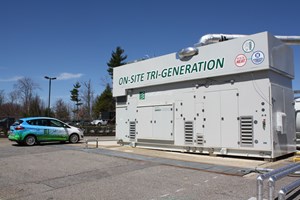May 28 2015
FuelCell Energy, Inc., a global leader in the design, manufacture, operation and service of ultra-clean, efficient and reliable fuel cell power plants, announces affordable on-site generation of high purity hydrogen for transportation and industrial applications using commercial fuel cell power plants.
A megawatt-scale FuelCell Energy hydrogen delivery system can generate more than 1,200 kilograms of hydrogen per day, suitable for larger industrial applications or adequate to power a fleet of more than 1,500 fuel cell cars while also producing two megawatts of ultra-clean electricity. The hydrogen and power is generated in a low carbon manner when operating on natural gas, or is carbon neutral when utilizing renewable biogas as the fuel source.
 Distributed hydrogen generation for manufacturing
Distributed hydrogen generation for manufacturing
"Our commercial distributed power generation solutions are configurable to provide multiple value streams including high purity hydrogen along with ultra-clean electricity and usable heat," said Chip Bottone, President and Chief Executive Officer, FuelCell Energy, Inc. "Resiliency of supply is enhanced with our affordable on-site delivery system, delivering power and hydrogen independent of external events that can interrupt the electric grid or surface transportation network."
Transportation applications
FuelCell Energy power plants support hydrogen fueling for fuel cell vehicles, illustrated by a three year demonstration project in California that converted renewable biogas from wastewater into high purity 100 percent renewable hydrogen for transportation. This fuel cell solution provides renewable hydrogen for transportation that is generated in a zero carbon manner, emitting water vapor and virtually absent of the pollutants that cause smog, generate acid rain and can exacerbate asthma.
The emerging transportation market has the potential to significantly increase hydrogen demand as vehicle manufacturers introduce hydrogen fuel cell vehicles and these vehicles need a fueling infrastructure. In addition, there is a growing fleet of fuel cell powered fork lift trucks which represent additional market potential for distributed hydrogen. Estimates for global shipments by 2017 for vehicle and material handling systems will exceed 300,000 units1. The hydrogen required by these vehicles would be enough to support a market of about $30 billion of fuel cell hydrogen delivery systems, plus service opportunities. The ability of the FuelCell Energy solution to utilize on-site renewable biogas offers an attractive opportunity to affordably and cleanly provide 100 percent renewable transportation fuel.
Industrial applications
Industrial users of hydrogen, including metal processors, glass makers, operators of large material handling equipment fleets and petrochemical applications, can benefit from environmentally friendly and affordable on-site hydrogen generation. FuelCell Energy is demonstrating these advanced manufacturing capabilities at its North American manufacturing facility with a stationary Direct FuelCell® (DFC®) power plant that converts clean natural gas into power and heat for the manufacturing process and hydrogen that will be used as an oxidation preventative in the manufacturing ovens, replacing purchased hydrogen. In addition, the fuel cells power an electric vehicle charging station located on-site.
Industrial demand for hydrogen is substantial with more than 9 million kilograms per day produced and distributed to end users2. As an indication of the market potential, if only ten percent of this industrial demand was met with fuel cell based hydrogen delivery systems, it would represent an addressable market for fuel cell plants of approximately $5 billion in the USA, plus Services opportunities. Global markets add another 40 to 50 percent to the market size3.
"We are powering the factory-of-the-future with on-site power and hydrogen generation as the fuel cell hydrogen system at our manufacturing facility is expected to save us more than $200,000 annually from reduced power and heating costs, and by avoiding the cost and delivery charges for hydrogen used in our process ovens," said Tony Rauseo, Chief Operating Officer, FuelCell Energy.
The hydrogen delivery system operating at the FuelCell Energy manufacturing facility is meeting approximately 30 percent of the electricity needs of the operation and will minimize the need for delivered hydrogen, reducing transportation-related pollutant emissions. The co-generation replaces heat produced by a combustion-based boiler, avoiding heating fuel costs and eliminating the associated pollutants.
The production cost of the hydrogen from megawatt-scale fuel cell plants is cost-competitive versus delivered hydrogen for industrial users and compared to the cost of gasoline for transportation uses. Pricing will depend on the location of the installation, value of the electricity produced and cost of fuel for the fuel cell power plant. The Federal Investment Tax Credit further supports the cost competitiveness of this on-site generation solution. In addition, on-site hydrogen generation provides a societal benefit by avoiding the emissions and traffic congestion from the delivery of hydrogen via diesel truck.
Compared to existing centralized generation of hydrogen, a 2 megawatt FuelCell Energy hydrogen delivery system is estimated to eliminate approximately 1,600 tons of carbon dioxide (CO2) emissions annually. These systems can also operate on renewable biogas, increasing the amount of avoided CO2 to 4,000 tons per year. Low carbon power generation by the on-site fuel cells further reduces the carbon footprint of the system compared to the electric grid and generating heat avoids the use of combustion-based boilers.
"The financial profile including the multiple value streams of our on-site power and hydrogen generation systems can attract private capital, minimizing the need for the site owner to directly invest in the hydrogen delivery system as we source the private capital to own the asset," continued Mr. Bottone.
The DFC stationary fuel cell power plants manufactured by FuelCell Energy utilize carbonate fuel cell technology and provide continuous power located where the power is used, including both on-site applications and electric grid support. The plants provide combined heat and power (CHP) capabilities, also known as cogeneration, supporting sustainability initiatives and economics. The plants are fuel flexible, capable of operating on clean natural gas, on-site renewable biogas, or directed biogas. Power is produced by an electrochemical reaction, resulting in the virtual absence of pollutants such as nitrogen oxide (NOx) that causes smog, sulfur dioxide (SOx) that contributes to acid rain, or particulate matter that aggravates asthma.